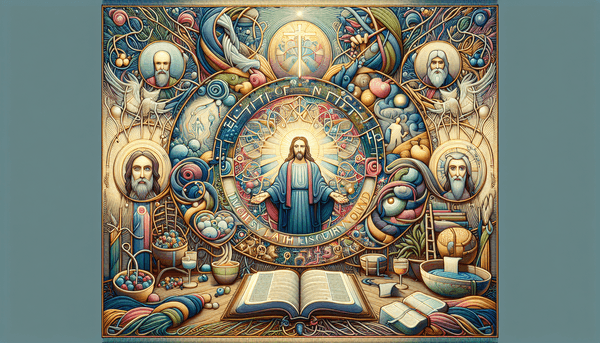The Nature of Faith in the Book of Hebrews
Hebrews 11:1 defines faith as 'the assurance of things hoped for, the conviction of things not seen.' This profound statement encapsulates the essence of faith—a confident belief in the divine promises and an unwavering trust in the unseen. The Book of Hebrews presents faith as the foundation upon which the saints of old built their lives. Abel, Enoch, Noah, Abraham, Sarah, and Moses are heralded as exemplars whose faith earned God's commendation. For instance, by faith, Noah, warned about events not yet seen, constructed an ark to save his family (Hebrews 11:7). Similarly, Abraham, when called to a place he would later receive as his inheritance, obeyed and went, even though he did not know where he was going (Hebrews 11:8). These narratives inspire us to view faith as a dynamic force that empowers us to act righteously and cling to hope amidst life's trials, affirming that 'without faith, it is impossible to please God' (Hebrews 11:6).
The Reality of God and the Creation of the World
The Biblical assertion that God is the Creator of heaven and earth is foundational to Judeo-Christian belief. Genesis 1:1 begins the Biblical narrative with, 'In the beginning, God created the heavens and the earth,' setting the stage for a universe crafted by an omnipotent being. While some demand empirical evidence of God's existence, the Bible suggests that faith in God transcends the need for proof. Romans 1:20 states that 'since the creation of the world God's invisible qualities—his eternal power and divine nature—have been clearly seen, being understood from what has been made.' This indicates that the natural world bears witness to the Creator, even if His essence remains unseen. The Gospel of John further reinforces this concept, asserting that 'through Him all things were made; without Him nothing was made that has been made' (John 1:3), thereby affirming the divine hand in the tapestry of existence.
Biblical Perspectives on Peace
Peace, as portrayed in the Bible, is both a divine gift and a calling. Jesus, referred to as the 'Prince of Peace' in Isaiah 9:6, imparts peace to His followers, not as the world gives but as a deep-seated state of tranquility (John 14:27). The Beatitudes elevate peacemakers, promising them the title of children of God (Matthew 5:9). This peace is not merely the absence of conflict but encompasses a holistic well-being and harmony within the human spirit and in relation to others. Romans 12:18 urges believers to 'live at peace with everyone,' signifying the importance of peace in maintaining societal and relational balance. The Apostle Paul speaks of the peace of God that surpasses all understanding, guarding our hearts and minds in Christ Jesus (Philippians 4:7), an inner serenity available to all who seek it earnestly and a theme further explored in our related discussion on biblical perspectives.
Being Created in the Image of God
The declaration that humanity is created in the image of God carries with it profound implications for understanding our self-worth and our interactions with the world. Genesis 1:26-27 reveals that we are fashioned to mirror God's character and nature, endowing us with intrinsic value and purpose. This likeness calls us to a stewardship role over creation and to love and serve one another, reflecting divine qualities in our relationships. The concept of human dignity and mutual respect arises from this teaching, as each person is a reflection of the divine image. James 3:9 challenges us by highlighting the incongruence of praising God while degrading others made in His likeness. Recognizing our creation in God's image provides a solid foundation for understanding who we are and how we ought to live in harmony with God and our fellow humans, as emphasized by Paul in Ephesians 2:10, which calls us to engage in good works prepared for us in advance.
Conclusion
Through this journey into the heart of Biblical theology, we have touched upon the pillars of faith, the certainty of God's creative work, the pursuit of peace, and the significance of being created in God's image. These themes are not isolated doctrines but are interwoven into the fabric of Christian doctrine and existential inquiry. As we conclude, let the insights gleaned from scripture serve as waypoints on our individual paths of spiritual growth and understanding. May we continue to seek the divine with hearts open to the lessons of faith, the wonder of creation, the embrace of peace, and the dignity inherent in our divine likeness.
FAQ
Q: What does the Bible say about peace?
A: The Bible describes peace as a gift from God that transcends understanding and as an ideal state of harmony in our relationships and inner being. Jesus Christ is referred to as the 'Prince of Peace', and His followers are called to be peacemakers and to live at peace with others.
Q: Is God real?
A: The Bible affirms the reality of God as the Creator of all things. While His existence cannot be proven in the empirical sense, scripture points to the natural world as evidence of His divine power and nature, and faith in God is presented as a personal conviction.
Q: How is faith described in the book of Hebrews?
A: Faith in the book of Hebrews is described as 'the assurance of things hoped for, the conviction of things not seen' (Hebrews 11:1). It is presented through examples of Biblical figures who trusted in God and acted upon their faith, even in the absence of visible proof.
Q: What are the implications of being created in the image of God?
A: Being created in God's image means we have inherent worth, are called to reflect God's nature in our behavior, and have a special responsibility towards creation and each other. It also emphasizes the importance of human dignity and calls for a personal relationship with God.





